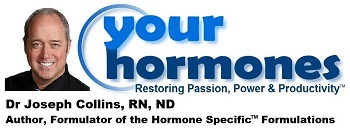
Total Hysterectomy Question
Question:
I am 46 years old, and had a total hysterectomy 10 years ago. My menopause symptoms began 10 years ago. I cannot take synthetic estrogens and cannot get my estradiol blood level above 20's. I also suffer from multiple allergies and am on prednisone. Help!
Answer:
A “total hysterectomy” means that the uterus and both ovaries were removed surgically. Since the ovaries are an important source of estradiol, progesterone and testosterone, it is no surprise when menopause symptoms occur right after the surgery.
Depending upon how adrenal recruitment (the adrenal glands being recruited to take over hormone production) takes place, virtually any menopause type (1 through 12) could show up after a total hysterectomy. It is not uncommon to see Menopause Type 11 (estradiol, progesterone and testosterone deficiency) occur after this surgery.
It is very important to consider that a total hysterectomy is a major surgery and any major surgery may cause enough stress on the endocrine system to affect the adrenal glands. In these situations the adrenal glands are not able to make up for the lack of ovaries - adrenal recruitment is usually quite weak - and the adrenal glands are not able to make the extra progesterone, testosterone and estradiol.
Unfortunately progesterone, testosterone and estradiol are not the only hormones that may be affected when the adrenal glands become so exhausted by major surgery. When a major surgery results in adrenal gland weakness, multiple hormone deficiencies may take place. These deficiencies can include cortisol, DHEA androstenedione and aldosterone. Cortisol and DHEA deficiencies can result in increased allergies and immune system disorders. Cortisol is a very important hormone that controls immune function, inflammation, mood, blood sugar balances, etc. A lack of cortisol will wind up in an increase incidence of allergies, increase inflammation of autoimmune disease. The symptoms of cortisol (a glucocorticoid) deficiency may be improved by providing natural cortisol, or by using synthetic glucocorticoids such as prednisone.
What do you do?
Consider high-grade nutritional supplement and provide the body with all the vitamins and minerals it needs to improve health of the adrenal glands so that they can be more effective in production of cortisol, DHEA and other adrenal hormones. The increased health of the adrenal gland will also help it be more effective in adrenal recruitment - the production of hormones that have dropped due to removal of the ovaries.
Have lab tests done to evaluate estrogen, progesterone and testosterone levels. If you use a saliva test, be sure to measure each hormone three times so they can be more accurately interpreted. If you use a blood test, make sure that the sex-hormone-binding-globulin (SHBG) is also tested, since abnormal SHBG can lead to inaccurate interpretation of blood tests. Also consider evaluating cortisol and DHEA, since they are important measurements of adrenal gland health.
Also consider adaptogenic herbs such as AdrenoMend™, a healthy diet, adequate rest, and adequate exercise. Work with a health care practitioner who will help enhance your adrenal gland function as part of the treatment plan. In addition to herbs, glandulars, hormone precursors or even natural hormones may be used in some cases.
Two things to remember when trying to restore balance after a total hysterectomy: 1) Estrogen, progesterone and testosterone levels are decreased due to removal of the ovaries. 2) Cortisol, DHEA and other adrenal gland hormones can be decreased due to the affect of the surgery on the adrenal glands. Discovering the menopause type and restoring balance is important, but additional evaluation and adrenal support may also be required.
Dr. Joseph Collins
